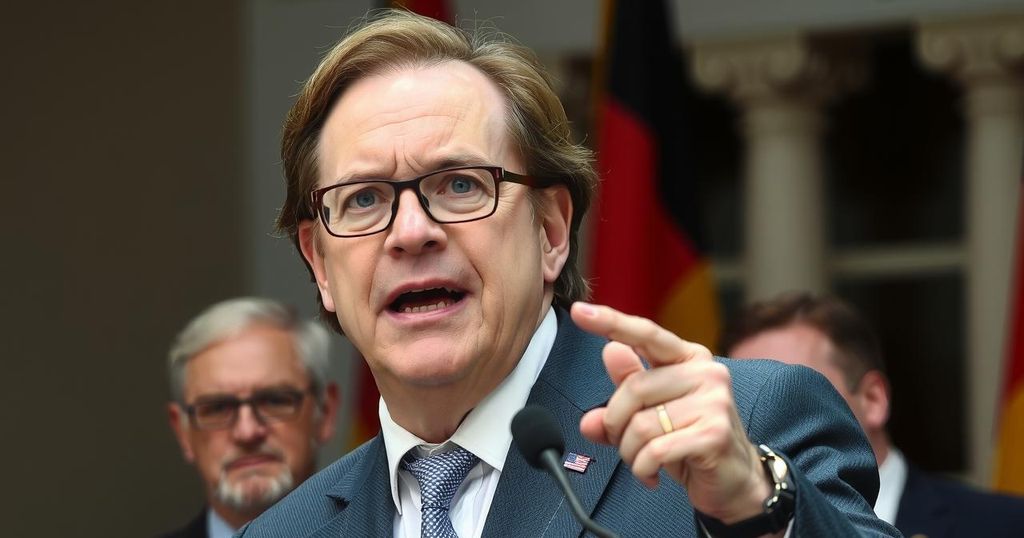German Chancellor Olaf Scholz Faces No-Confidence Vote Ahead of Early Elections

German Chancellor Olaf Scholz has lost a no-confidence vote, leading to early elections on February 23, following the collapse of his three-party coalition. With the conservatives holding a significant lead in the polls, the political landscape in Germany is shifting amidst growing economic challenges and a fragmented parliament.
On Monday, the German parliament accepted Chancellor Olaf Scholz’s request to withdraw its confidence in him and his government, thereby setting the stage for an early election scheduled for February 23. This decision follows the disintegration of Scholz’s three-party coalition, primarily due to the departure of the pro-market Free Democrats over disputes concerning fiscal policies. Consequently, the Social Democrats and Greens no longer retain a parliamentary majority amidst a growing economic crisis in Germany.
Under German constitutional law, aimed at preventing political volatility reminiscent of the early 20th century, the President can only dissolve parliament and call for elections if the Chancellor requests and subsequently loses a no-confidence vote. The debate leading up to the vote sparked vigorous campaigning, with both Chancellor Scholz and his conservative opponent, Friedrich Merz, exchanging sharp criticisms regarding competence and strategic vision.
In his defense, Scholz emphasized his record as a crisis manager responding to the economic and security upheaval triggered by Russian military actions in Ukraine, stressing the need for significant investment in Germany’s beleaguered infrastructure. He remarked, “Shortsightedness might save money in the short term, but the mortgage on our future is unaffordable.” Merz countered by asserting that Scholz’s spending intentions would impose burdens on subsequent generations, accusing him of neglecting promises to bolster Germany’s defense capabilities since the onset of the Ukraine war.
Polls indicate that the conservatives maintain a significant lead over Scholz’s Social Democrats, with the far-right Alternative for Germany (AfD) gaining traction against the backdrop of a fragmented political environment. The mainstream parties’ refusal to collaborate with the AfD complicates coalition scenarios going forward.
Prior to the election, Scholz proposed potential measures to gain opposition support, such as tax cuts and increased child benefits, while also navigating political agreements to ease tax burdens on citizens. However, Merz rejected a proposal from the Greens to reduce energy prices, advocating instead for a new energy policy altogether. Scholz’s impending caretaker role and the contentious political landscape raise questions regarding the feasibility of forming a stable government post-election, according to Green party candidate Robert Habeck, who expressed concerns about the challenges ahead in achieving governmental unity.
The situation surrounding Chancellor Olaf Scholz’s loss of confidence in the German parliament and the subsequent call for early elections stems from the breakdown of his three-party coalition. The pro-market Free Democrats exited the coalition amid disagreements over fiscal pressures, leaving the Social Democrats and Greens without a parliamentary majority at a time when Germany grapples with a significant economic crisis. In light of these events, President Frank-Walter Steinmeier is compelled to call for elections following the Chancellor’s failed confidence vote, a constitutional measure aimed at preventing political instability.
The acceptance of the no-confidence vote against Chancellor Olaf Scholz marks a pivotal moment in German politics, prompting early elections slated for February 23. The collapse of his coalition amid economic pressures and the contentious campaign environment present challenges for the future of governance in Germany. With polls favoring the conservative opposition significantly, the outcome of the upcoming elections will be critical in shaping the nation’s political landscape and economic strategies moving forward.
Original Source: www.foxnews.com








